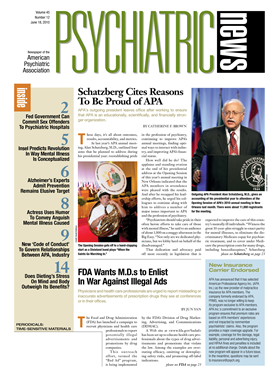It was probably the first time an APA Convocation speaker offered herself up to any willing psychiatrist as a “bipolar bride”—but then anyone who was expecting Carrie Fisher to give a conventional talk was at the wrong meeting.
At APA's 2010 annual meeting in New Orleans, the star of stage and screen, novelist, screenplay writer, and memoirist delivered a short but vibrant description of her long experience with depression and bipolar disorder and with psychiatric treatment.
Along the way she treated members at the William C. Menninger Convocation Lecture to a seemingly light-hearted tour of a rambunctious Hollywood life that included at least one bedmate whom she discovered to be dead when she woke up (“My psychiatrist asked me if he was dead when we got in bed, which I thought was insightful. I said, ‘Not that I'd noticed.’”)
Fisher, who is perhaps most famous for her role as Princess Leia in “Star Wars,” has fashioned a comical take on a life that might be generously described as colorful (or more honestly described as chaotic and painful). And her sense of humor about celebrityhood lends her a perspective that other Hollywood types could probably use. (Informed that Desmond Tutu would be the Convocation speaker at the 2011 annual meeting in Honolulu, Fisher garnered laughs when she suggested she could see the connection—Carrie Fisher, Desmond Tutu. “Wasn't he good in ‘Star Wars?’”)
But her remarks also revealed that the humor is a mask for much emotional suffering, and she did not hide her earnest appreciation of what psychiatric treatment has done for her. She commented especially on the “bad rap” given to electroconvulsive treatment, which Fisher said she had been receiving.
“Those treatments really did work miracles for me,” she said. “I wish I had done it years ago because I might have been able to shortcut some of these long drives up and down the mood mountain. But like most people, I believed the [misinformation] I heard about ECT, so that I had to be really desperate in order to agree to this so-called barbaric treatment.”
And she also celebrated the importance of psychotherapy. “I believe in insight,” she commented. “I believe in the borrowed perspective that my psychiatrist and confessor sitting across from me could give. I believe in you. And that belief panned out—you listened to me.... Without help from psychiatrists, I would be in a back room somewhere watching reality TV.”
The lecture was preceded by the induction of 359 new fellows and 52 life fellows into the Association. Also inducted were 88 new distinguished fellows (those who have been APA members or fellows for eight years and who have made a significant contribution to the profession) and 172 distinguished life fellows (those whose age and years of active membership equal 95). Life fellows and life members who have held APA membership for 50 years were also recognized. All were greeted with applause as they solemnly processed at the start of the session into the large hall in the New Orleans convention center.


